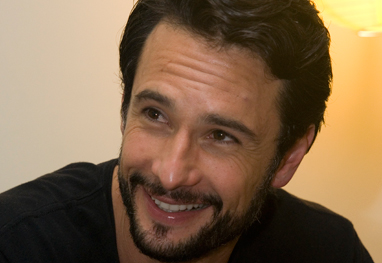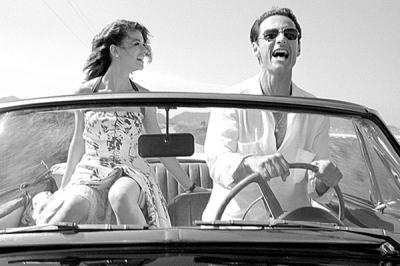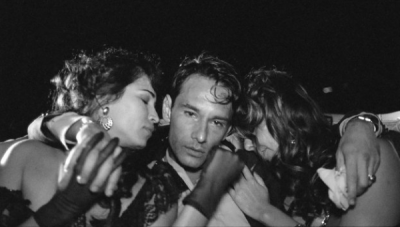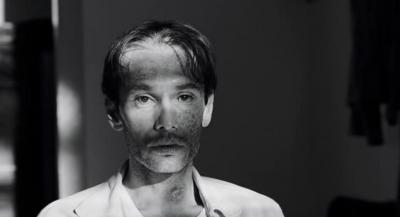By: debbie lynn elias
Heleno de Freitas is a name synonymous with the history of soccer. One of the world’s greatest players in the 1940’s, he is legendary in his home country of Brazil. Rocketing to the forefront as a leader in the sport, Heleno achieved fame of almost mythical proportion thanks not only to his skills on the field, but his lifestyle off. Living the glamorous life with a wife at home, a mistress, a woman on each arm every night as he made his way through the glitz and glamour of the clubs of Rio, hobnobbing with the rich and famous, to the world, Heleno seemed to have it all. But there was a dark side to him, a side that ultimately cost him his career and his life. Behind the cheers and applause of adoring fans, there was a man filled with anger, rage and ego, who was a chain-smoking, ether addict with advanced syphilis, a relatively untreatable disease at the time that would drive him to madness and into a sanitorium until his dying day.
Enter director Jose Henrique Fonseca and actor Rodrigo Santoro. Fascinated by the legend of HELENO, Santoro dove head first into the project, not only immersing himself into the character, but also coming on board as a hands-on producer. Involved in every facet of the production, Santoro, together with Fonseca create a beautiful portrait of a man plagued as much by magic as by madness.
Shooting in black and white, cinematographer Walter Carvalho creates a stunning palette, transporting us into the glossy and gritty world of 1940’s Rio while Fonseca takes us on a trip down memory lane with a cat-and-mouse, back-and-forth style of storytelling as HELENO edges ever closer to death in the haze of syphilis-induced madness. Thanks to the black and white lensing not only do we have the glossy lushness of the day, but a”newsreel” feel which works surprisingly well for this particular story as it also places one in the magic of nostalgia of the day.
Not a straight biopic, HELENO, is more a poetic interpretation of the man. However, it is this poeticism that allows Rodrigo Santoro to soar with his performance of the tortured Heleno and despite Heleno’s personal demons, makes for a riveting compassionate portrait that leaves the audience wanting to try to understand the man. In today’s world, Heleno would have made for glorious tabloid fodder. Is there another actor out there today that could bring the athleticism, poetry, passion, pathos and arrogance to HELENO that Santoro brings? I highly doubt it. This is one of his best works.
I had a chance to talk in-depth in this exclusive one-on-one interview with Rodrigo Santoro about HELENO – the man, the myth and the making of.

Seeing you in HELENO after seeing you in What to Expect When You‘re Expecting, the only possible word is “WOW”.
So, did you have a good time [watching]?
Definitely! You bring this great poeticism to the part of HELENO that is so fascinating to watch. You are mesmerizing on screen in this role.
I appreciate it.
I had never heard of HELENO before. What is it about this part that drew your attention to this film?
I’ll tell you how it was approached by the director. I did not know about [Heleno], as well. He was the biggest soccer player in the 1940’s. I wasn’t familiar with his story. I have heard of his name and knew he was a great player. The director came to me and actually showed me a picture of this player. I was very intrigued by the picture. There was something about the body language and something about the way his body was positioned. It was very very elegant, first of all. There was a lot going on in that picture. I was like, “Okay. That’s very interesting. It doesn’t look like a regular soccer player. It’s more like a dancer.” There was something about it that really caught my attention. Then [Fonseca] started to tell me the stories, all the stories, [about] who was [Heleno], because this guy was a myth. Really, literally, there are so many stories about him that I just started to be more and more fascinated with the stories. We interviewed a lot of people like a biography and we had a lot of pictures. There’s no footage on him. But we did interview people that are still alive from that time, like 95 year old guys that had stories, some guys that had actually played with him, a lady that had an affair with him, all kinds of stuff. I was just fascinated with it. Then we realized how important he was, he is, for Brazilian soccer history.
Bottom line is that there was so much about this guy that interested me and fascinated me that I was immediately connected to the story, interested, and then I got very involved with the whole process. The director invited me to produce the film with him. I was not planning to do that. I really thought that the character was complex enough for me to put my energy there, but I was just involved. I was artistically involved in the whole process. That was it. And we just decided, we have to make this film.

This is definitely a film that needed to be made about this man, but also, just for the sheer elegance and beauty of the film. You really capture the period, the romanticized aspect of the period, while showcasing the mythology and the demons of the man.
You got it. I think you really got it. I’ll tell you what. It was really hard because we didn’t have a big budget at all. We had a veeery low budget to do this film. And we’re doing this period piece, soccer, stadiums, extras, costumes from that time – very very tricky things to put together. [Fonseca] is very creative but the main thing is that this became a passion project for me and for the director. We hand picked every single professional from every single department. It was literally like, “Let’s build a National Team here. Let’s get the best people we can and the people that we really want to work with.” For instance, we decided to do it in black and white. We ALWAYS wanted to do it in black and white. That’s way before The Artist came out, just to clarify. Because a lot of people said, “Oh, that’s so cool after The Artist.” I’m so glad that The Artist came out and it was a success because a black and white movie can have some prejudice. Nowadays everything is so colorful.
That‘s something that so many people forget. With black and white you get so much more cinematically and thematically with you grays. You can do a lot more and especially with something that is such a psychological profile in so many respects. I cannot see this film being done in color.
That’s what we thought. Believe me, a lot of studios wanted to do it in color, wanted to do it with a happy ending and all that stuff. Thank God, the director was pretty strong about what he wanted and then we did have a partner who came at the last minute who was the sponsor for the film. It’s the biggest model entrepreneur in Brazil and he is the one who actually made this film happen financially.

Putting your producer’s hat on for a minute, having now stepped into the artistic development of a film and working and selecting your craftsmen, your artisans, your crew, does this now give you a different perspective when you approach roles for other films?
Yes, I think that working as a producer definitely taught me a lot about filmmaking. I participated in the whole process this time. As an actor, you arrive and do your job and go back home. You’re there to do what an actor does. The producer is really involved in many many things. It’s constantly about solving problems. Bigger problems, smaller problems, trying to put it all together, trying to have an artistic vision of what you are doing. It’s about putting pieces together and seeing if they match or if they don’t. There are just so many things. It was a great exercise for me. Every script that I’ve been reading, I do have a different look, but don’t get me wrong. I am not thinking about leaving acting. That’s not happening. I like it. I really really love what I do. I want to do that. I’m still very curious and I think I have a lot to explore and to learn.
You are so chameleonic in your performances. You go from playing Xerxes in 300, you play a light romantic comedy like Love Actually, you do a Redbelt.
That’s the fun of it for me. I talk from the bottom of my heart. I do not do that because I think I’m gonna look cool. I do that because it’s fun, it’s what really gets me going, what triggers me. I do have an appetite for the non-average Joe. I like it. I’m excited about it. I want to do things that are different than me [where] I’m gonna learn. I do enjoy the process of researching. I really really enjoy it. It’s when I play. It’s when I go back to my childhood and when I play and explore and try and make mistakes and it goes left, right, up and down; how can I make this real? It’s all about how to approach and how to bring the humanity to the part. At the end of the day you just want it to be human, you just want it to be relatable. It doesn’t matter if it’s a villain, if it’s a good boy, he’s a hero, a bad boy, black, white, blue – it doesn’t matter. It’s a human being. It’s a person. And who’s going to be watching? Another person. There’s another person on the other end, so how do you make the connection? Through feelings, through emotions, through everything that is universal. That’s the very reason that a film, a Brazilian film, can be watched by an American person and can relate to it, or even not relate to it, but he can understand it, he can have an interaction with it because therefs a universal aspect which is humanity. We have different language. We have different cultures. But at the end of the day we do suffer form the same reasons. We smile for the same reasons. We are all in the same boat. We are all humans.
That‘s one of the things that really stands out with your performance as HELENO. With all of his demons, this film could have gone so far to the extreme without the proper performance so as to make him unlikeable. You bring such compassion. You understand the temper, you understand the rage, you understand the fame and the drive, so you never alienate the audience. That is such a fine line with this character.
That was the biggest risk and we knew that. We talked about it all the time. I was very close to the director and he really gave me a lot of freedom to work, to improvise, to try many things. We were really worried, especially because this character existed and was a real person. Even though my generation did not have a reference – we didn’t know him, I didn’t know, nobody knew him – we realized the importance of this character. Brazil is a soccer country and this guy was king. He even had a nickname, one of his nicknames, was The Cursed Prince because he left his mark wherever he went. He definitely left his mark. When we were interviewing people, people that were still alive, really older guys and women that had stories about him, most of the stories would give him a very bad rap, really a bad boy. Women – love him. Some guys – really really love him, too, they want to be his friend. But, a lot of guys hated him. I’m hearing all those stories and I was like, “Okay, Okay.” They were very passionate. I realized that I had to be extra careful. I‘m always very careful how I approach a character that I‘m about to play because I really try to avoid any stereotype or caricature, especially a character like this that is painted in such black and white; that he was such a bad boy, he did this, he did that. I thought, “I have to be very careful to understand who was the man behind all those stories. I really need to bring humanity to this guy.” Otherwise, all the situations you have in the movie, all the stories – when he is at the beach and he asks the little boys to punch him in the face – absurd. Like, why is this guy doing that? And especially when he’s in his last days in an institution.

Tell me about preparing for those scenes and that time in HELENO’s life.
I worked with what we call “madness” before, in another film I did a long time ago. I went to institutions. I’ve been into this environment and I’ve studied it very closely. So this is the second time that I’m dealing with this matter and I learned something very important when I did the film a long time ago. We in society classify things – “Oh, crazy. Oh, whatever.” There are names and we just classify. We prejudge of what it is, what we think it is. And when I got close to it, I saw how delicate it is, and how we cannot just generalize and call people “crazy”. And that’s what it is – just a stereotype of people that have mental suffering. There’s all kinds of mental suffering. I encountered people that were so smart, overly smart, and thatfs the very reason they were in there. What I’m trying to say is that the risk, the trap was falling into a stereotype, especially when you are portraying faces and body. How do you portray it, especially in Heleno’s case because it was caused by syphilis which is a very specific damage that it does to your brain? There’s symptoms, there’s side effects, there’s many little things. So I did spend a lot of times with a syphilis specialist, a doctor, in Sao Paolo in Brazil who gave me a lot of information. I exchanged a lot of information with her, talked, just to understand all the details about it that we were going to try and show in everything; like, what was going on. At first, youfre going to see a [big] picture. But, if you start to pay attention there are little details about how he’s behaving. It has to do with syphilis. So, the risk was there the whole time but that’s also what makes him a complex, deep and interesting character.
At the end of the day with this particular film, what did you personally take away from the experience of making HELENO or learn about yourself in the process?
I would say many things, especially having a chance to work producing and acting. That was a little overwhelming. It was a bit overwhelming sometimes but I think what I take away is that – – you know when you go into a premiere and the producers come to the microphone and you kinda know what they’re gonna say, which is how hard it was to put the film together – I’m talking about independent films, not big studio films. . .I finally understand and comprehend 100% what that means. I finally really could experience it – the difficulty to put it all together, to really convince people of your dream of what you’re trying to do. Now, to be here, talking to you about something that five years ago that I didn’t really know if it was going to happen or not, it is really gratifying. It makes me feel very good about it. So what I take away from it, it‘s really worth it to take risks and to believe in whatever you believe. Just stay with it.
#











